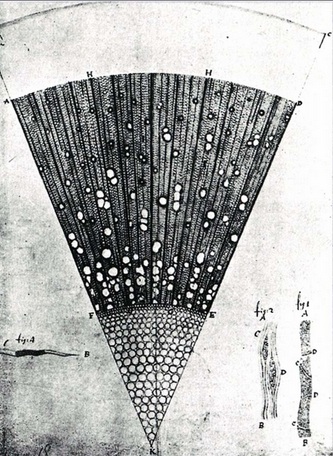Paradigm Shift in Cell theory TOK postcard
Discoveries lead to new ideas
 Guiding question
Guiding question
How have scientific discoveries changed the way we understand the world around us?
From the time of Aristotle, if something was alive and moved, then it was an animal but if it did not move, then it was a plant. Before the mid 1600's, everyone knew there were plants and animals. And that was all there was, according to the Bible and other sacred and scholarly writings. Along comes Robert Hooke in England in 1665 who published his Micrographia, which showed the first drawings of cells. This work caused great excitement in the scientific world as others began to search for more cells. Anton van Leeuwenhoek in the Netherlands is credited with the first viewing and description of living cells. This opened a whole new view on the natural world. As more and more observations were made, scientists described plant-like cells that moved, so what happened to Aristotle's dichotomy?
Reflective questions
What issues keep other people from accepting new ideas?
When are new ideas accepted by others and what is special about these ideas?
Are paradigm shifts unique to the natural sciences? If not, how are paradigm shifts in the natural sciences different from those in other areas of knowledge?
Examples from Biology
Hooke, van Leeuwenhoek, Schwann and Schleiden and finally Virchow contributed to the cell theory. Each one added to the collection of knowledge of cells being the basic unit of living things and of structure and function.
Van Leeuwenhoek was also the first to describe bacterial cells in 1683, making him the founder of bacteriology but it was Pasteur and Koch who made the science of bacteriology by the scientific method of disproving spontaneous generation and establishing the germ theory of diseases.
Perspectives
How would you feel if a new life form was discovered around you?
The search for extra-terrestrial life forms on Mars or other planets may result in such a discovery. How will humans deal with the relevation of not being the only planet with life?

 IB Docs (2) Team
IB Docs (2) Team
